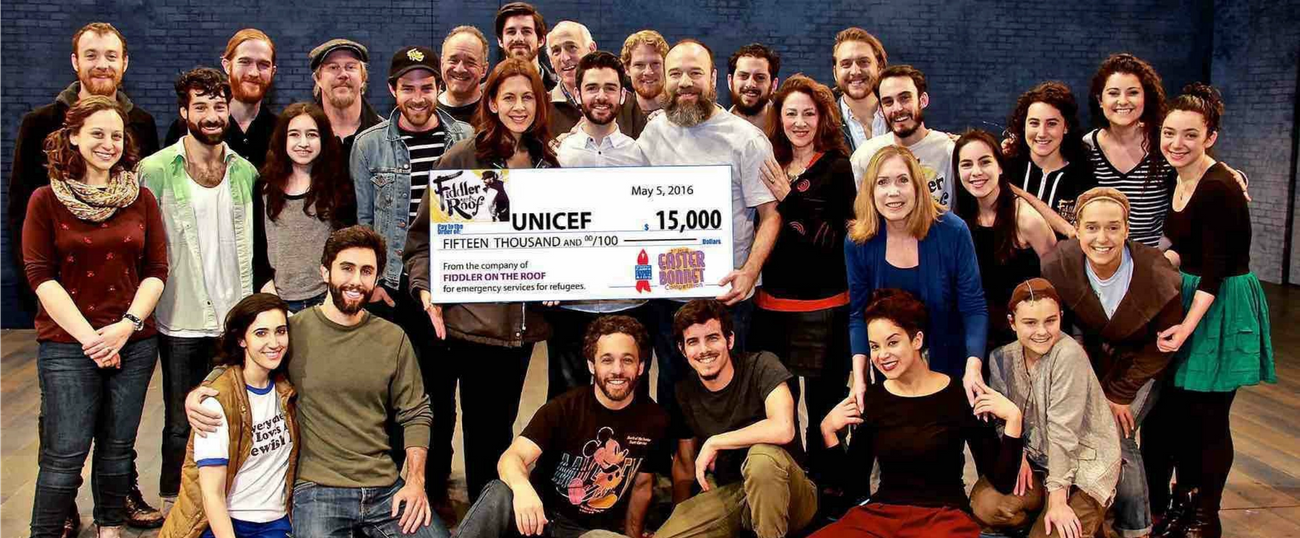Broadway’s ‘Fiddler’ Raises Money for Refugees
When connections between the people of Anatevka and Syrian refugees became apparent, the cast of ‘Fiddler on the Roof’ began to fundraise both onstage and off




Searing, heartbreaking images of Syrian refugees were everywhere when rehearsals started for the current Broadway revival of Fiddler on the Roof. “Every day we would talk about it,” said Adam Kantor, who plays the young tailor Motel in the Tony-nominated production.
As director Bartlett Sher and his cast dug into Bock and Harnick’s score during the rehearsal process, the parallels between today’s refugees and the townspeople of Anatevka became too apparent to ignore. What distinguishes the villagers in the musical from a majority of refugees today, however, is a detail discussed briefly in the musical’s script: The townspeople of Anatevka leave their home knowing with some degree of certainty where they’ll go.
When people synopsize the classic musical, they typically refer to “a milkman and his five daughters.” But what Fiddler essentially portrays is how a community sustains its cultural identity when its citizenship is endangered—and that resonated, drawing a line between the musical with the refugee crisis.
Sher felt increasingly certain that to tell the Fiddler story truthfully, he would have to access it through a contemporary lens. With that vision, he added a modern-day character who opens and closes the show, a nameless observer whose own refugee status is open to audience interpretation. “The Syrian refugee crisis so directly connects to the plight of the play,” said Jessica Hecht who plays Golde, the matriarch of Fiddler, which will come to a close on Broadway (this time around, at least), on December 31.
It was Hecht who first proposed a weekly fundraising drive to her cast mates. She and her dresser, Erin Brooke Roth, began baking desserts, selling them backstage, and donating the money to refugee-based organizations. “The first one we did was [for] MOAS—Migrant Offshore Aid Station—and we raised $700 for them in just a few weeks,” Hecht said. Bake sale funds have also benefited the UN Refugee Agency.
Cast members brought added visibility to refugee relief on Twitter, linking to UNICEF and encouraging their followers to contribute. The cast also agreed to match donations of $20 from anyone who contributed through its Twitter campaign.
Help #ChildRefugees! @FiddlerBroadway is matching gifts @unicefusa RT to #donate $20 – follow instructions in reply. pic.twitter.com/DsJlvxsOXk
— Adam Kantor (@AdamJKantor) March 18, 2016
Soon after, Kantor had the idea to ask Broadway Cares for a grant to support UNICEF’s work with refugee children.
“Twice a year Broadway raises funds for Broadway Cares and they give grants to many wonderful organizations,” Kantor said. “I approached Tom Viola, the head of Broadway Cares, and said, ‘We’re really passionate about the refugee crisis. Our show is about a group of people who become displaced. Can we give a percentage of what we raise toward helping refugees around the world?’ ”
As part of Broadway Cares/Equity Fights AIDS’ biannual fundraising drive, the Fiddler cast made post-performance announcements for six weeks, stating specifically that donations would support refugee children. The cast raised $65,000 in total for Broadway Cares and received a grant of $15,000 that would support UNICEF’s work with refugee children through services that include housing, education, and family reunification.
Kantor also created a video blog for Broadway.com, affectionately called “Motel Citizen,” in which he and Hecht discussed the various fundraising initiatives among their cast that have supported refugees.
It isn’t the first time a Broadway cast has organized a charitable giving campaign, Kantor said, “but I think we’re the only show that has focused [specifically] on this refugee crisis.”
UNICEF estimates that the number of people today who live on the run is 65 million, the largest population since World War II. The cast and crew of Fiddler continue to donate on a weekly basis and have recently expanded their outreach to include other organizations that tie in to the musical. One such example is Operation Backpack, which supplies homeless children with backpacks and school supplies. Hecht said that her onstage daughter Chava, who is passionate about reading and education, inspired that donation.
“I want to do something with this experience that’s more than what I do as an actor,” said Hecht, a veteran performer who has starred in A View from the Bridge, and on TV’s Breaking Bad. Hecht is quick to recall the moment last fall that motivated her to do more on behalf of refugees. It was around the High Holidays when she heard a poem read at synagogue called “Home,” written by Somalian refugee Warsan Shire. The poem begins: No one leaves home unless, home is the mouth of a shark.
“I shared it with the cast,” Hecht said. “It’s devastating and it’s all-encompassing. And it inspired us.”
Previous: An Interview with the Man Who Made Tevye Sing
Related: Hofesh Schecter Makes ‘Fiddler’ Dance
‘Fiddler,’ in the Key of My Heart
Unorthodox: Miracle of Miracles
Lonnie Firestone writes about theater, and lives in Brooklyn, New York.